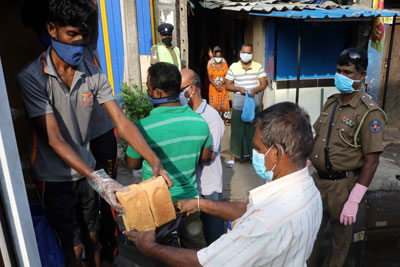News
CAA cracks the whip on online sellers: Fixed prices announced
The Consumer Affairs Authority (CAA) is now running strict surveillance across all platforms for any incidents of consumer exploitation through exaggerated prices, its Chairman Maj Gen (Rtd) D.MS. Dissannayake said.
“We have asked sellers to sell at the maximum retails price while products without such a demarcation have been given controlled prices by the CAA,” he said, referring to the recent spurt of online grocery shopping services.

With complaints mounting about food sellers making exhorbitant profits, police are seen keeping a watch as this vendor sold bread in Colombo's Union Place area. PIc by M.A.Pushpa Kumara
The CAA recently raided the office of kapruka.com, a popular e-commerce platform, for selling essential food items at prices higher than the maximum retail prices fixed by the Government.
A Consumer Affairs Authority Official said, “We received several online complaints that Kapruka was selling a can of salmon for Rs.570 though the government’s fixed price was Rs. 100 and that other necessities like wheat flour were being sold at inflated prices.”
Initial investigations revealed that the organisation was issuing a bill that only had the total price instead of an itemized bill.
“We specifically requested an itemised bill and it showed that goods were being sold at higher prices. The company was also practising a rupee-to-dollar and dollar-to rupee double conversion method which was adding around another Rs. 1000 to the bill,” the official said.
The organisation’s officials initially tried to justify the exorbitant prices. But they eventually rectify the pricing formula after the CAA officials warned them of legal action.
The company has been asked to refund the excess money it had charged from customers within a week.
Accordingly, the company had returned Rs. 7.6 million it had overcharged from 1,500 orders. “The rest of the refunds are also being calculated as we speak,” the CAA official said.
Complaints against the company kept coming in even after the raid. One was about the company charging Rs. 1,300 to deliver a Rs. 100 can of fish. The company has since refunded this charge.
Kapruka, however, said most of the complaints were part of a campaign by competitors to tarnish the company’s name. The CAA has advised the company police complaints could be lodged against false complainants.
The CAA official said they would file a case against the company once courts resume sittings.
CAA Chief Maj Gen (Rtd) Dissannayake said the regulator had now released an official price list for vegetables to deter opportunistic sellers and legal action would be taken against any organisation which sells foot items above the fixed prices.
Rigorous regulation has come into effect after the Kapruka incident to crack down on sellers exploiting people during the curfew.
Merchants have set up online platforms and door-to-door delivery systems to provide people with household needs from food to gas. Popular supermarket chains have established hotlines and online ordering through which groceries are delivered to homes. A delivery charge is added to the bill.
Apps like Pickme are also working in coordination with Sathosa to help deliver food items and other essentials. Pickme CEO Zulfer Jiffry said that Pickme had provided the government with information about their riders and cooperating with contact tracing procedures. He said the company regarded the riders’ health as a priority and they were provided with masks, gloves and other protective equipment.
Lassana Flora was one company that received criticism on social media for the poor quality of vegetables it delivered. Lasantha Malavige, it’s Founder and Chairman, said that services had since been streamlined.
This was an overwhelming task undertaken by suppliers under present conditions, he said. Obtaining vehicle permits had been especially challenging with different police officers interpreting the regulations differently.
Drivers had often found themselves apprehended by one police division though they carried passes issued by another police division, he said. A Government circular first said employees of essential service providers only required their Identity Cards (ID) or work ID and confirmation that the business they were attached to was an essential service.
Now, only company vehicles were allowed to make deliveries, Dr Malavige said.


